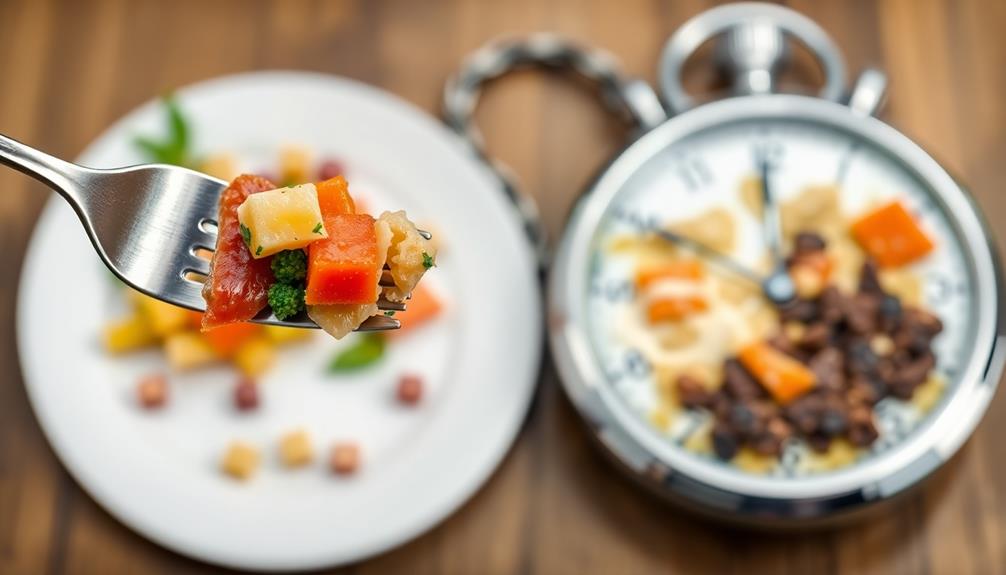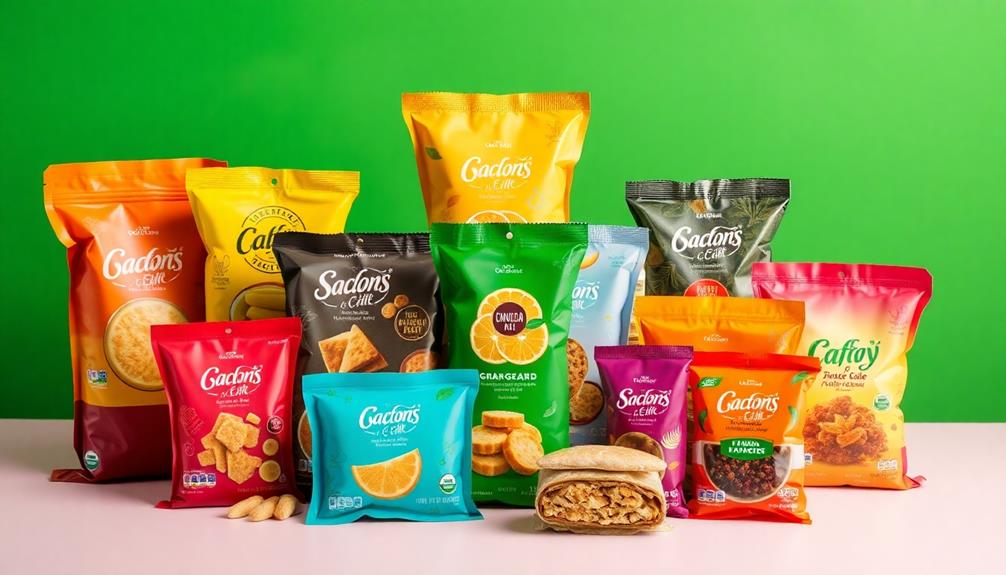Eating speed has a big impact on how you digest food and feel satisfied after meals! Here's how:
- Eating too fast can cause bloating and discomfort.
- When you take your time, you chew better, which helps digestion.
- Slow eating lets your body know when you're full, so you enjoy your meal more!
- You'll also likely eat less, as rushing often leads to overeating.
So, savor the flavors and chat during meals. If you make a few small changes, you might find your meals are even more delightful! There's more to discover about making mealtime magical!
Key Takeaways
- Eating slowly allows for better chewing, enhancing digestion and nutrient absorption, while fast eating can lead to discomfort and indigestion.
- Slow eating promotes the release of hormones like cholecystokinin (CCK) that signal fullness, reducing the likelihood of overeating.
- Mindful eating increases meal satisfaction and enjoyment by allowing individuals to savor flavors and textures, while fast eating can diminish these experiences.
- Fast eaters often produce more ghrelin, leading to increased hunger and decreased feelings of fullness, which can contribute to weight gain.
- Slower eating habits are linked to lower calorie consumption and a reduced risk of metabolic syndrome and related health issues over time.
Impact of Eating Speed on Digestion

Eating speed significantly impacts digestion, and it's important to be mindful of how quickly you consume your meals. When you eat too fast, you mightn't chew your food well enough, making it harder for your body to break it down. This can lead to uncomfortable feelings like indigestion and bloating.
Enjoying a meal that incorporates flavors from traditional Brazilian dishes can enhance your dining experience and encourage mindful eating habits.
Here's why eating speed matters:
- Missed Satiety Signals: If you rush through your meal, your body doesn't get enough time to tell you it's full. This can lead to overeating.
- Hormones and Fullness: Eating slowly helps your body release hormones like cholecystokinin (CCK), which aids digestion and makes you feel satisfied.
- Energy Intake: Fast eaters often consume more calories because they finish their meals quickly without paying attention to portion sizes.
- Nutrient Absorption: Taking your time allows for better nutrient absorption, as your body can break down food more effectively.
How Eating Rate Influences Satiety

The rate at which you consume your meals plays an essential role in how satisfied you feel afterward. Eating slowly lets your body send important hormonal signals, like cholecystokinin (CCK) and peptide YY (PYY), to your brain, telling it you're full.
When you take your time, you might notice you're less hungry and enjoy your food more, enabling you to appreciate the rich flavors found in dishes like Nettle and Potato Soup and their nutritional benefits.
Here are some fun tips to help you eat at a slower pace and feel more satisfied:
- Savor Each Bite: Take a moment to enjoy the flavors and textures of your food.
- Put Down Your Fork: Between bites, set your fork down to give yourself a break.
- Engage in Conversation: Chatting with family or friends makes the meal last longer and keeps it fun.
- Mind Your Portion Sizes: Serve smaller portions and go back for seconds if you're still hungry.
Physiological Responses to Fast Eating

Fast eating can trigger a range of physiological responses that negatively impact your digestion and overall health. When you eat quickly, especially with rich dishes like Red-Braised Pork Belly, you often don't chew your food well enough, making it harder for your body to digest and absorb nutrients. This can lead to bloating and discomfort—definitely not the fun you want at dinner!
Your eating rate can also mess with important signals that tell you when you're full. Fast eaters might miss these satiety signals, which means you could overeat. This can cause your body to produce more ghrelin, a hormone that actually makes you feel hungrier. Instead of feeling satisfied, you might end up feeling like you could eat another plate!
Additionally, hormonal responses like the release of satiety hormones, such as cholecystokinin (CCK), aren't as effective when you rush through meals. This means fewer feelings of fullness after eating.
Over time, fast eating can increase your risk of metabolic syndrome, which can lead to serious health issues. So, let's slow down, savor our food, and enjoy every bite for better health and happiness!
Behavioral Patterns in Eating Habits

Eating habits can be quite the adventure, especially when you think about how fast or slow you munch your food!
Some of us might've a natural speed when it comes to eating, influenced by our families or the busy world around us.
For instance, enjoying a leisurely meal with a delicious Turkey Sandwich (For Leftovers) can encourage slower eating, allowing us to savor the flavors and feel more satisfied.
It's exciting to explore how these different eating rates can change how full we feel and even how much we enjoy our meals together!
Eating Rate Variability
Understanding eating rate variability reveals how individual habits can markedly impact overall energy intake and satisfaction.
When you eat fast, you might miss important satiety signals that tell your body you're full. This can lead to overeating, while slow eaters often find greater satisfaction from their meals. In fact, research shows that those who take their time can consume about 25% less energy from snacks later on!
For instance, enjoying a Graveyard Taco Dip at a Halloween party can encourage slower eating as you savor the layered flavors and festive presentation.
Here are some fun insights about eating rate variability:
- Fast Eating: Can lead to a feeling of hunger soon after meals.
- Slow Eating: Helps you enjoy your meal more and feel fuller.
- Interruptions: Slower eaters often maintain their intake, while fast eaters might eat even more when distracted.
- Environmental Cues: Larger portions can make you eat faster, thinking the food might disappear!
Genetic Influences on Intake
Genetics shapes your eating habits more than you might realize. You might think that your food choices and how fast you eat are all about willpower, but genetic factors play a big role too!
For instance, individuals who enjoy rich flavors may gravitate toward dishes like Mushroom Masala due to their taste preferences. Studies show that identical twins often have very similar eating rates, while fraternal twins may differ more. Isn't that fascinating?
Certain genes influence how your body regulates appetite and responds to hormones that signal satiety. This means some folks might feel full faster, while others can munch away happily!
Here are a few key points about genetic influences on your eating habits:
- Eating Rates: Some people naturally eat faster because of their genes.
- Hormone Responses: Specific genes affect how your body releases hormones that tell you when you're full.
- Food Intake: Genetic traits can lead to differences in how much food you enjoy at a meal.
- Appetite Regulation: Some may have strong cravings, making it hard to resist snacks.
Understanding these genetic factors can help you adjust your eating speed, leading to better weight management and healthier choices.
Effects of Chewing and Food Texture
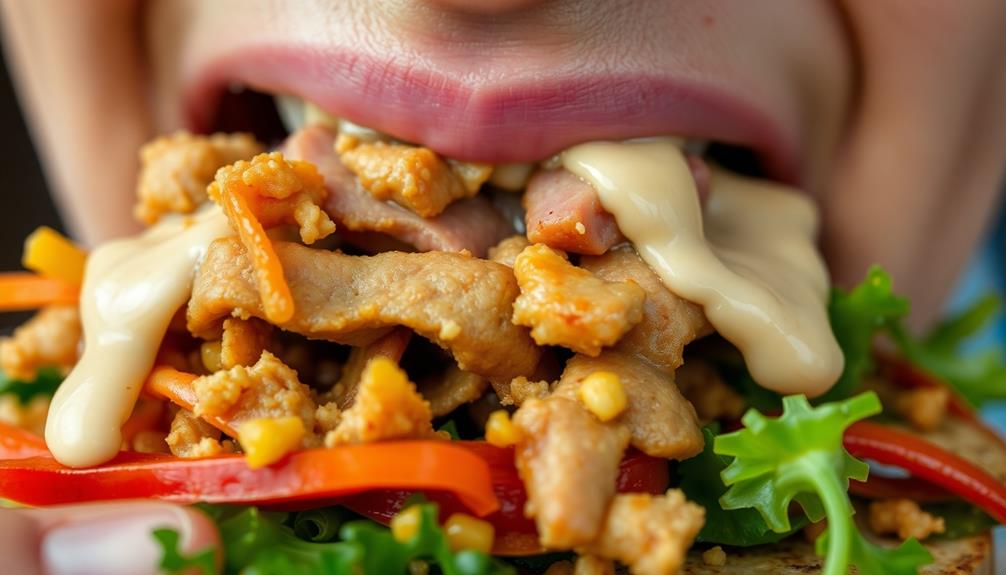
When you chew your food thoroughly, you're not just enjoying the flavors, but also helping your body absorb more nutrients! When you chew your food thoroughly, you’re not just enjoying the flavors, but also helping your body absorb more nutrients! Properly chewing breaks down food into smaller, more digestible pieces, allowing enzymes to work more efficiently during digestion. Interestingly, one of the reasons for bitter taste sensitivity is that it may have evolved as a protective mechanism to help humans avoid potentially toxic substances. This sensitivity can also influence our food preferences and impact the overall dining experience.
Softer foods might seem quicker to eat, but chewing longer can actually make you feel fuller and happier after meals.
For instance, dishes like Agnolotti and Pasta Alla Norma, with their varied textures and rich flavors, encourage mindful eating.
Importance of Chewing Thoroughly
Thoroughly chewing your food plays an essential role in digestion and overall health. When you take the time to chew your meals well, you help your body break down food into smaller pieces. This makes it easier for your body to absorb nutrients and aids in digestion.
For example, enjoying dishes like Dorayaki (Red Bean Pancake) can be a delightful experience, as the fluffy texture encourages slow eating. Plus, chewing can actually help you feel fuller and more satisfied!
Here are some key benefits of chewing your food well:
- Better Digestion: Chewing breaks down food, making it easier for your stomach to do its job.
- Increased Nutrient Absorption: Smaller food particles help your intestines absorb nutrients more effectively.
- Enhanced Satiety: The more you chew, the more your body signals fullness, helping you eat less overall.
- Fewer Calories: Slower eating and more chewing can lead to a reduction in total caloric intake.
Influence of Food Texture
How does the texture of your food affect your eating experience and digestion? The texture can really change how you enjoy your meal!
When you chew harder and denser foods, like a Loaded Baked Potato, you're not just having fun with your food; you're also helping your body. Chewing more means your saliva and digestive enzymes can work better, making digestion smoother.
Here are some key benefits of food texture:
- Greater Satiety: Chewing well sends signals to your brain, telling it you're full. This helps you feel satisfied and less likely to overeat.
- Nutrient Absorption: The more you chew, the smaller the food pieces get. This helps your body absorb important nutrients better!
- Lower Calorie Consumption: Those who chew more tend to eat fewer calories because they take their time and really enjoy each bite.
- Meal Enjoyment: Textured foods make eating exciting! They encourage slower eating, which helps you savor your meals.
Overeating and Its Consequences

Overeating can sneak up on you, especially when you eat too quickly. When you rush through your meals, you might miss those important satiety signals that tell your body it's full. This can lead to overeating, which can cause discomfort and affect your digestion.
For instance, enjoying dishes like Chilaquiles: A Mouthwatering Mexican Dish can be a delightful experience when savored slowly.
Here are some consequences of fast eating:
- Digestive Discomfort: You might experience bloating and indigestion because your food isn't properly chewed.
- Metabolic Issues: Studies show fast eaters are more likely to face metabolic syndrome, increasing risks of obesity and heart disease.
- Hunger Confusion: Rapid eating disrupts hormonal signaling, which can lead to leptin resistance, making you feel less full.
- Lower Meal Satisfaction: People who eat quickly often report less enjoyment and satisfaction from their meals.
Role of Mindfulness in Eating

When you eat mindfully, you really pay attention to what's on your plate!
This helps you notice when you're full, so you can enjoy smaller portions without feeling deprived.
Plus, focusing on the flavors and textures makes every meal a delightful experience for you and your family!
Mindful Eating Techniques
Mindful eating techniques can transform your relationship with food, making meals more enjoyable and nutritious. When you practice mindful eating, you pay full attention to your food experience, helping you tune into your hunger cues and feelings of fullness.
This simple shift can boost your satisfaction after meals and help prevent overeating!
Here are some fun mindful eating techniques to try:
- Eliminate Distractions: Turn off screens and focus on your meal. This helps you truly enjoy every bite!
- Slow Down: Take smaller bites and chew thoroughly. This not only enhances digestion but also allows your body to send fullness signals to your brain.
- Savor the Senses: Pay attention to the taste, texture, and aroma of your food. It makes the meal more delightful!
- Breathe Deeply: Take a few deep breaths before you eat. This relaxes you and creates a peaceful atmosphere for your meal.
Impact on Portion Control
Portion control plays an essential role in maintaining a healthy diet, and practicing mindfulness can greatly enhance your ability to manage it. When you eat slowly, you really get to savor every bite, which makes meals more enjoyable and satisfying.
Mindful eating techniques, like chewing thoroughly and pausing between bites, help you listen to your body's hunger and fullness signals.
Here are some exciting benefits of mindful eating for portion control:
- Eating Rate: Slowing down can help you eat up to 25% less during meals.
- Fullness: Mindful eating encourages your body to release hormones like PYY and GLP-1, which promote feelings of fullness.
- Satisfaction: Paying attention to your food can make it taste better, boosting your overall satisfaction.
- Healthy Habits: Recognizing emotional and environmental triggers helps you avoid mindless snacking.
Strategies to Slow Down Eating

Slowing down your eating can greatly enhance both digestion and satisfaction, so it's essential to adopt effective strategies. By taking your time during meals, you allow your body to recognize signals of satiety and enjoy your food even more!
Here are some fun tips to help you slow down:
- Set a Timer: Allocate at least 30 minutes for your meals. This gives your stomach time to tell your brain it's full!
- Chew, Chew, Chew: Aim to chew each bite 15-30 times. This not only helps with digestion but lets you savor every flavor.
- Sip Water: Take small sips of water between bites. This creates natural pauses and encourages slower eating.
- Be Mindful: Turn off screens and put away distractions. Focus on your meal and the people around you for a more enjoyable experience.
Long-term Health Implications
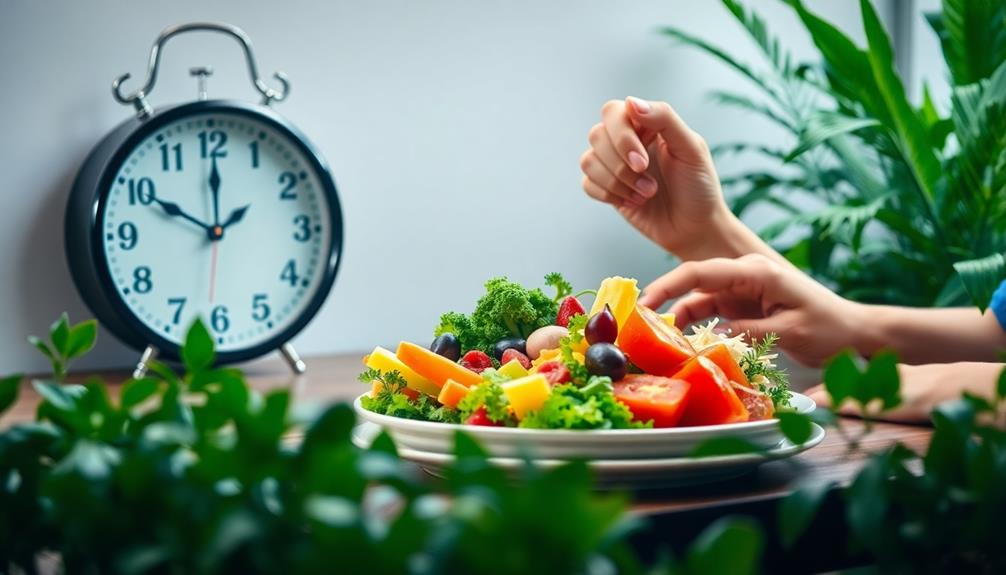
Eating at a rapid pace can have significant long-term health implications that extend beyond immediate discomfort. When you rush through meals, it can lead to poor digestion, making your tummy feel bloated and uncomfortable. Over time, this can mess with how your body absorbs nutrients.
Here's a quick look at how eating speed affects your health:
| Implication | Description |
|---|---|
| Metabolic Syndrome | Fast eaters are more likely to develop this condition. |
| Increased Body Mass Index | Rushing leads to weight gain and higher BMI. |
| Hormonal Responses | Slow eaters feel fuller faster due to hormones. |
| Disrupted Hunger Signals | Fast eating often results in overeating. |
| Risk of Chronic Diseases | This includes issues like diabetes and heart disease. |
You see, when you eat quickly, your body misses important signals about satiety. Slower eating allows your body to tune into those signals, helping you maintain a healthier weight. By paying attention to your eating speed now, you can enjoy better long-term health for years to come! So, take a moment to savor your meals and celebrate each bite!
Tips for Improved Meal Satisfaction
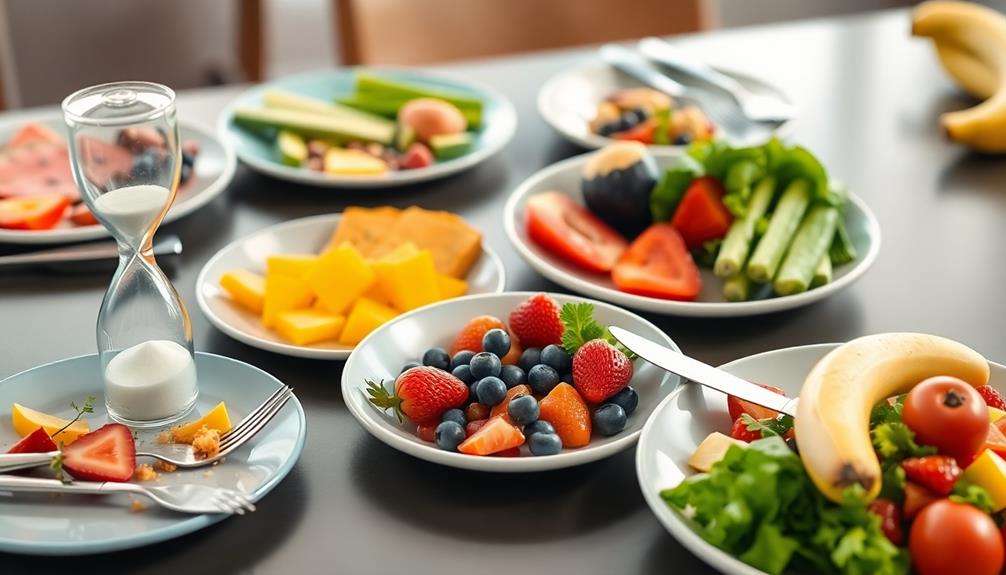
To enhance your meal satisfaction, focus on savoring each bite and creating a more mindful dining experience. When you slow down and enjoy your food, you give your body time to signal fullness to your brain, just like the slow rate group.
Here are some tips to help you enjoy your meals even more:
- Chew Slowly: Aim to chew each bite 15-30 times. This helps break down food better and makes it easier for your body to absorb nutrients.
- Sip Water: Take sips of water between bites. This not only hydrates you but also encourages pauses, promoting a sense of fullness and preventing overeating.
- Mindful Eating: Turn off distractions like screens while eating. This allows you to focus on your food and recognize your hunger cues better.
- Use Smaller Utensils: Try using smaller forks or spoons. This can naturally slow your eating speed and help you enjoy each bite more.
Implementing these small changes can boost your meal satisfaction and make every meal a delightful experience!
Enjoy your food, and happy eating!
Frequently Asked Questions
Does the Speed You Eat Affect Your Digestion?
Yes, the speed you eat affects your digestion. When you rush, you might not chew properly or notice when you're full, leading to discomfort and potential digestive issues that can impact your overall health.
Does Eating Slower Improve Digestion?
Yes, eating slower definitely improves digestion. You'll chew your food more thoroughly, allowing your body to break it down better, absorb nutrients effectively, and reduce discomfort. Slower eating can lead to greater satisfaction and overall well-being.
What Happens to Your Digestive System When You Eat Fast Food?
When you devour fast food like a ravenous beast, your stomach's overwhelmed, struggling to process the greasy, sugary chaos. This leads to bloating, discomfort, and that dreaded post-meal crash, leaving you feeling sluggish and unsatisfied.
What Is the 20 Minute Rule for Eating?
The 20-minute rule for eating means you should take your time during meals. By slowing down, you allow your brain to register fullness, helping you enjoy your food more and avoid overeating.
Conclusion
So, when you take your time to savor each bite, you're not just eating—you're enjoying a delightful adventure! Eating slowly lets your tummy dance with joy, and you'll feel full and happy much quicker. Remember, it's not a race; it's a feast! By chewing thoughtfully and being mindful, you can turn every meal into a festive celebration. So, gather your loved ones, take a deep breath, and let the joy of slow eating fill your hearts!

